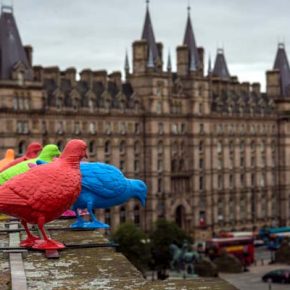Ground Bird Flown
Layers of clear
rainbow shine guide
you through the pyramid portal into
open air revelation.
Joy on a stick, in your soft eyes,
closed in death, with permanent grace.
For all the gifts your gave,
daily miracles, flutterings,
vocalizations, accumulating in song.
For your fragile vessel, energy octave
higher than us wingless dwellers.
Your fearless power streaked
into the lining of your feathered coat,
patterned gold thick veins
washed in sparkling sand.
Beautiful Sage of the flowerbed gardens,
the blueberry, the hempseed swallow,
fearless messenger, angelic power
bound in a small body, you were
loved completely for everything
that you were, gave,
held lifeforce for. You were
soft, demanding and rich
with good humour
stretching, expanding
higher, wider, wings aflare, lifting
in pure vibrant dance, puffed and proud,
your freedom actualized, raised
only inches off the ground.
The Closing
Part 1
Eight years ago
it entered, building force
gradually, started
embryonic, developed
organs, blood vessels, a brain,
then talons like tentacles
gripped from the inside
strangling the light, passing
its poison into the bloodstream, feeding off
of adolescence fears and anxiety.
It started small, moments of rebellion,
grew irrational, unkind,
ended in violence – a smashed glass extending
its tear into every room, crevices, vents.
Sacred hope sacrificed to indulge
in dark extremes. Love denied, turned
on its side unable to struggle enough
to set itself upright.
Now it is here, overtaken,
apparent in heavy footsteps,
sleep deprived eyes, unshowered
hair, a room as breeding ground
for clutter and chaos.
I take you with two hands, grip your sloughing shoulders,
your tarry taste and destructive tongue.
I take out what has entered, send it back to the void
and that line of heritage it travelled upon.
I fill the empty pocket with light, first mending it with
the tender-thread of God and the sharp-point of truth.
I iron-gate the place where it left and pour a concrete wall.
I bless this house. I clear the corners, the ceiling, floorboards.
I call the Buddha that was born with you to reawaken,
for my army of angels to lift up their swords. We are
still here. We are love, and love
is the centre, the carriage and the tide,
never defeated, stronger than the frantic pulse,
stronger than the wielding axe and the ash of its remains,
stronger than this cursed person you wear and claim,
strongest now in this hopeless hardened place,
in this choice, beginning.
Part 2
Step, bless your
new shoes, step and
hold the sun on your tongue like a berry,
leaving an indelible juicy mark,
be guided by other people’s wisdom
as long as it doesn’t undermine your own
and watch yourself enter Eden-Earth in its many glorious
forms – dive into small mounds of sand, pieces of glass,
spiraling trees, trunks, bulging and retracting in individual rhythm,
a solid movement, stunning as music.
Take this choice from disaster,
offer it the path of the impossible, a pathway into
a miracle because God counts for everything,
counts on flat and hot surfaces,
counts on the deathbed and
in the red coat
beautiful gleam
Part 3
The way forward is
the way back, clearing
stumbling blocks that promise
to repeat ahead if not killed
at their source.
To hold the truth even if it tells you
that love is limited in people, certain people
who play both sides – one foot in the basin of heaven
and the other glorifying the haphazard world.
Even if it tells you you cannot save
or be saved by a half-hearted account of kindness,
tells you, it is nothing
to be bitter over, nothing personal and also
not yours to bear the repercussions,
tells you to continue all the way, hold firm
to the thin road and the willingness to lose everything –
home, sacred room, the safety of your own –
for the divine request to follow. Follow then
the tulips
still managing to bud in backyards untended,
follow then with God at the helm.
You are not abandoned, not like the tin-foil wrapper,
or the chewing gum chewed,
or worn-through undergarments. You are protected
and that protection is warm and powerful and golden
as an owl’s steady eyes. You are afraid I know.
The doors you used to knock on are
boarded up. Steel eyes lock on you, mock you in your anguish.
It feels ruthless, brutally barren,
feels that way only until you fully let go.
I let go. I drop my past, my precious cargo, drop you
and follow, hearing faint the voice that tells me –
The only thing I have to do to receive God’s love
is to believe in God’s love.
Allison Grayhurst is a member of the League of Canadian Poets. Four times nominated for Sundress Publications “Best of the Net”, 2015/2017, she has over 1125 poems published in over 450 international journals. She has fifteen published books of poetry, six collections and nine chapbooks. She lives in Toronto with her family. She is a vegan. She also sculpts, working with clay; www.allisongrayhurst.com



